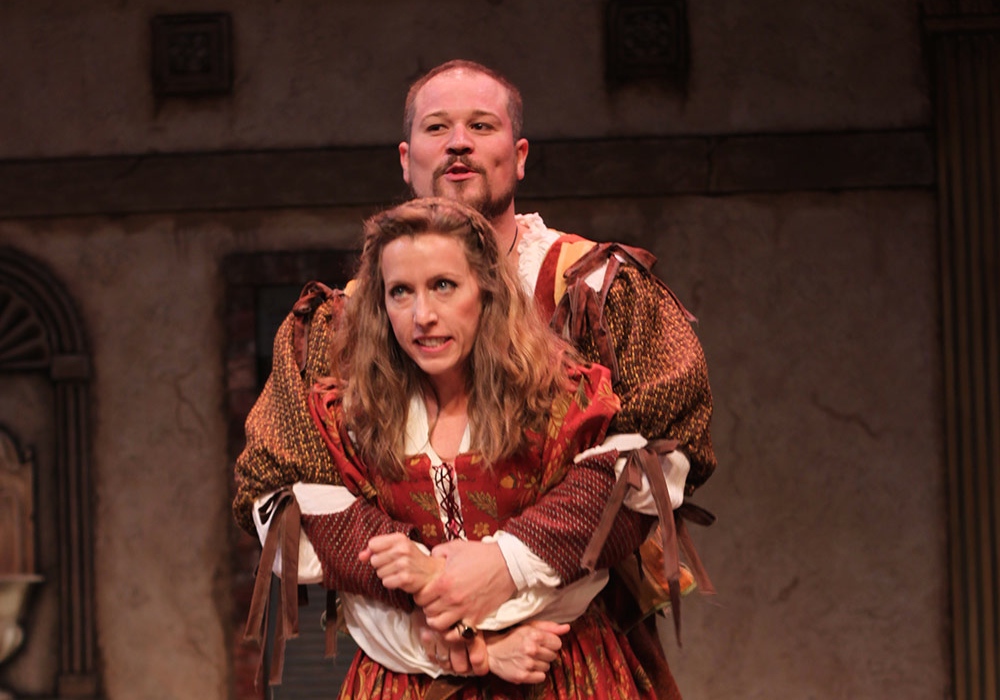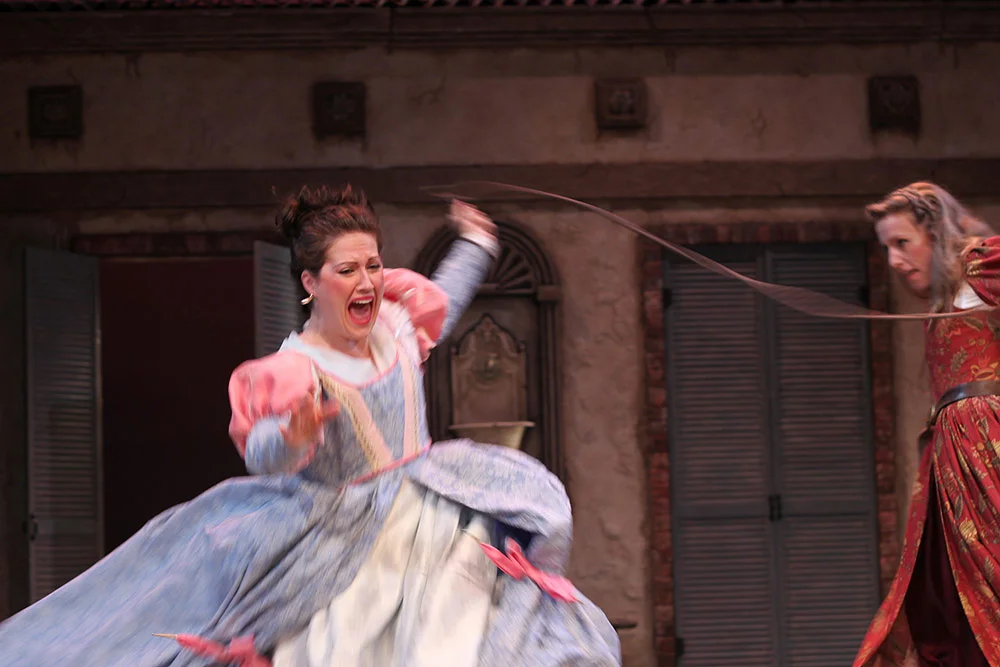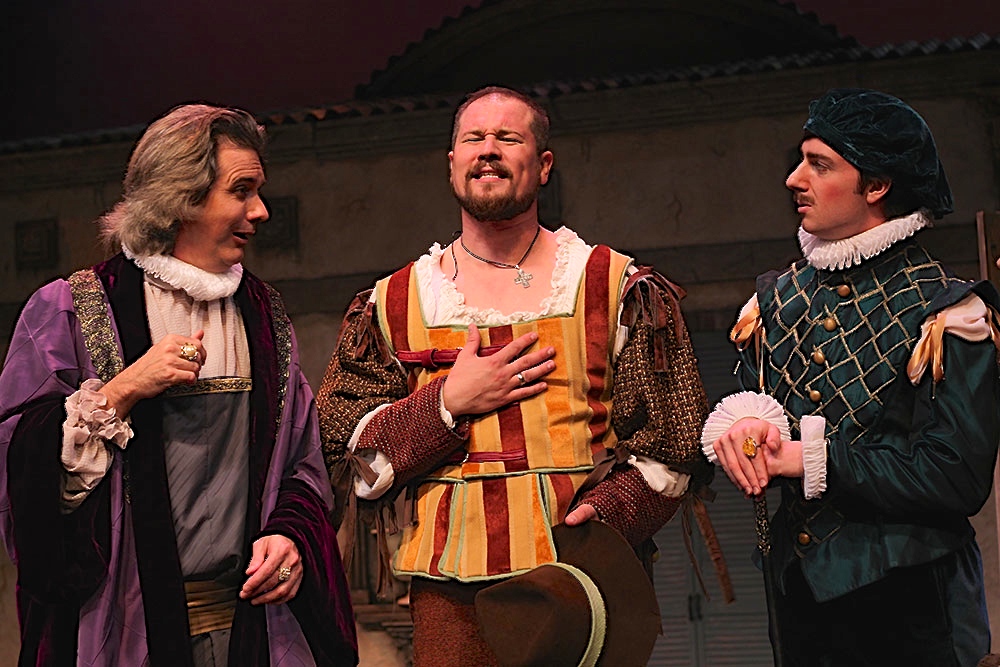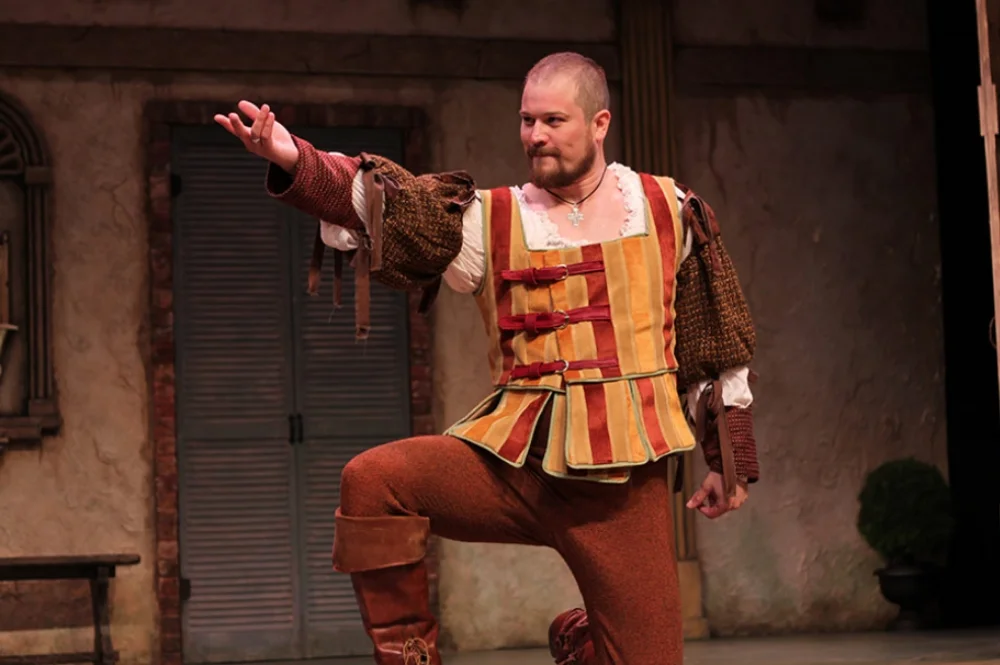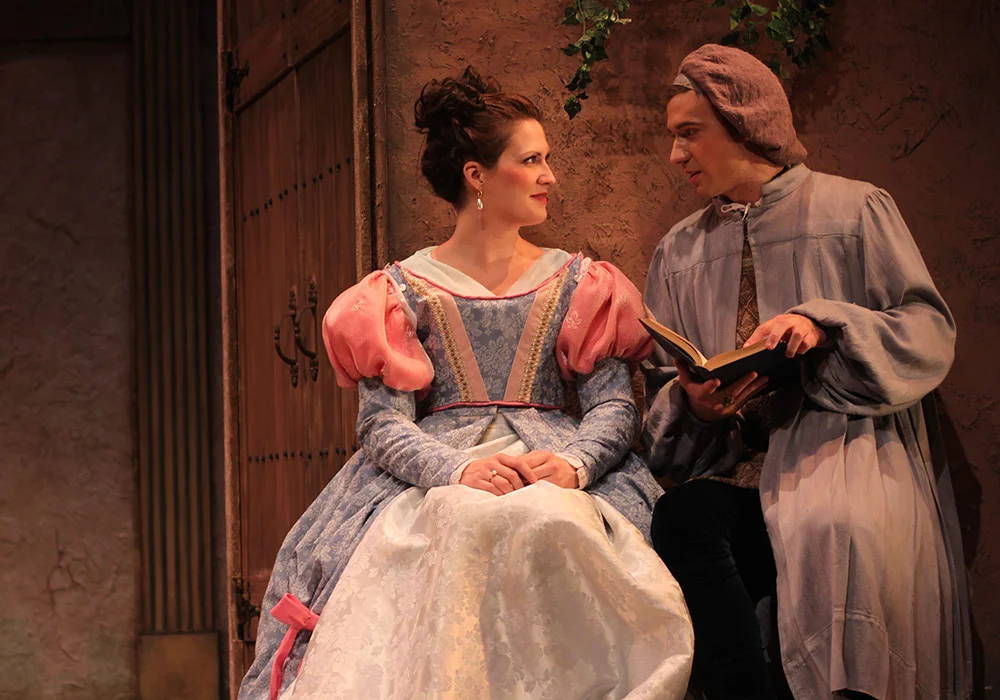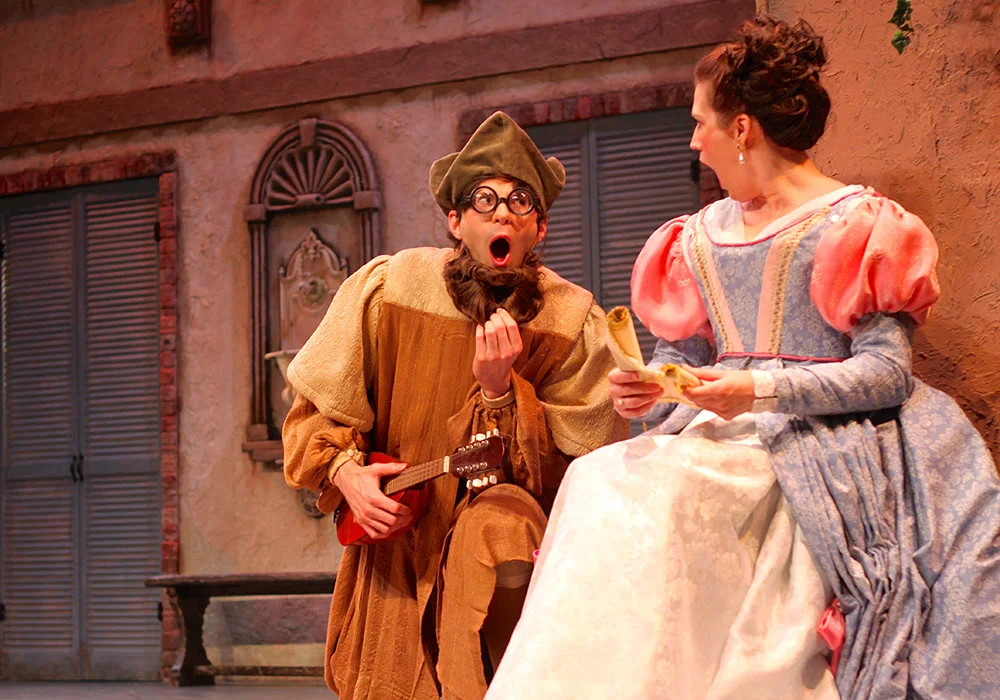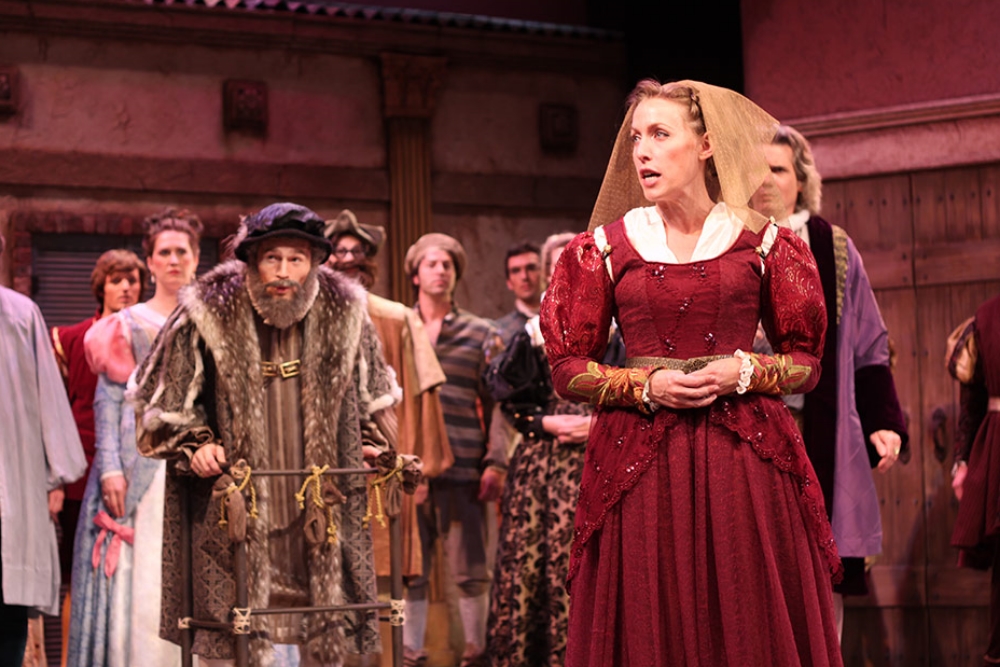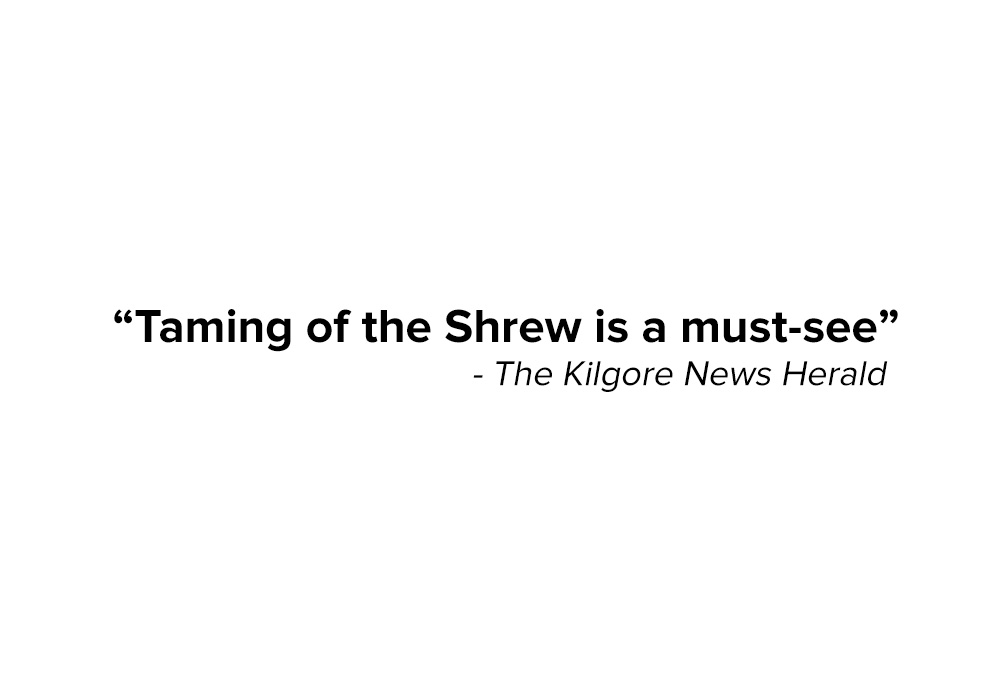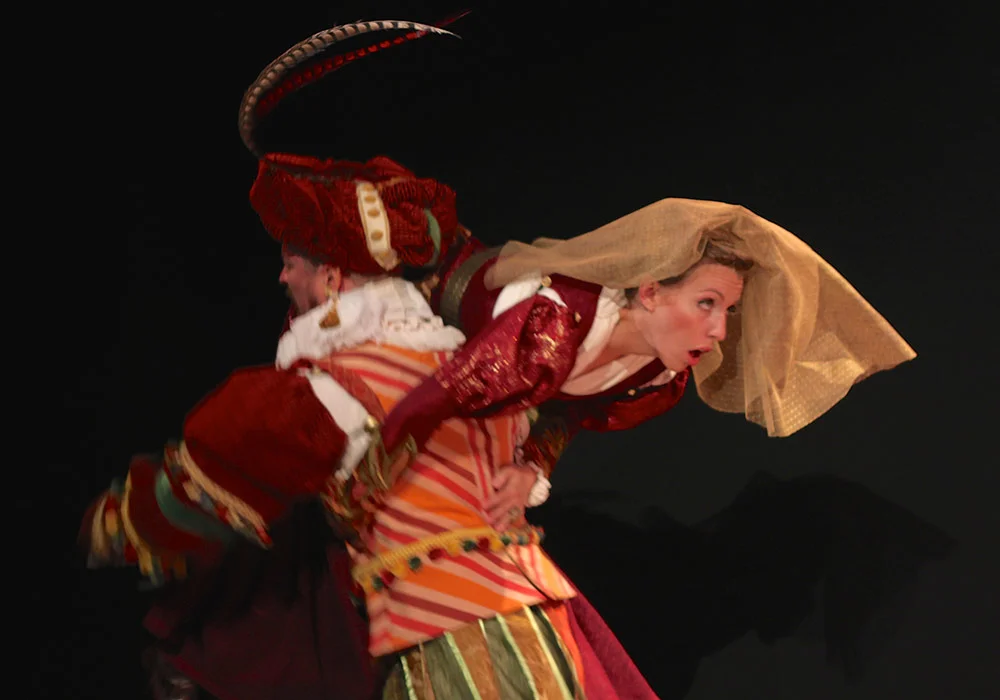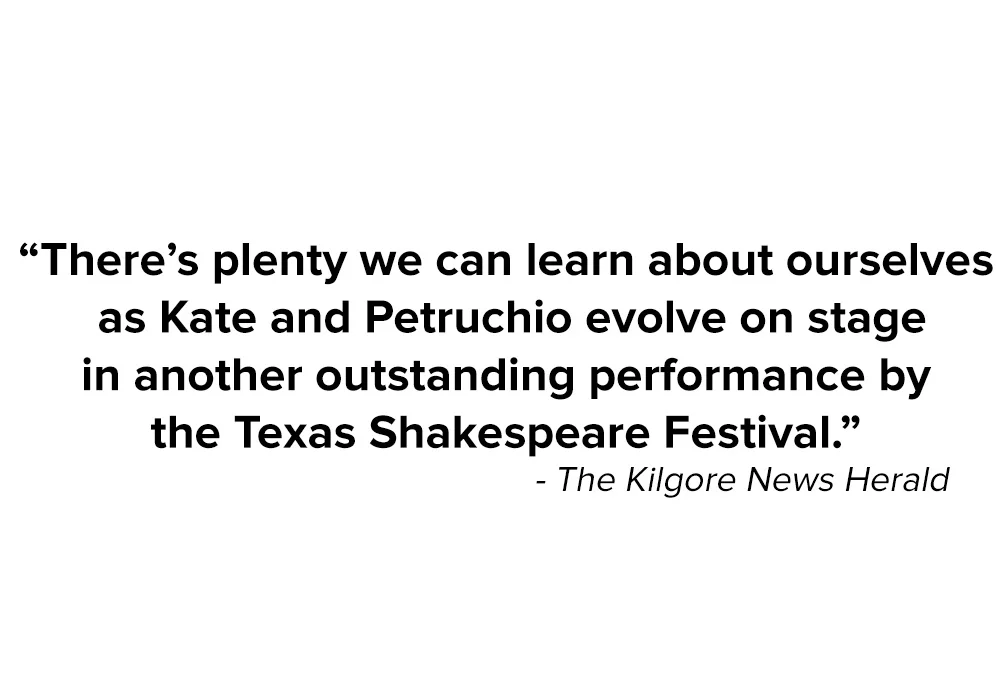THE TAMING OF THE SHREW
TEXAS SHAKESPEARE FESTIVAL (25th Anniversary Season)
The Kilgore News Herald
'SHREW' SHINES AS FESTIVAL'S FIRST SHOW
Gentleman, be warned:
The Texas Shakespeare Festival’s staging of The Taming of the Shrew is a must-see, but see that you don’t clap for the wrong reasons.
Controversial in its own time, William Shakespeare’s 16th century tale to some seems a celebration of misogyny, and the men in the audience might take notes on how not to treat the women and wives in their lives.
But to boil Shakespeare down to one interpretation or the other is to miss the point. Anti-feminism, male chauvinism, sexism, whatever your -ism, the humor and hijinks here are the real elements, the ones that audience can truly enjoy and will remember after they leave the theater.
As we watch Shakespeare’s characters live, love, laugh and labor through the course of play we see them change, mostly for the better, and there’s plenty we can learn about ourselves as Kate, Petruchio and the others evolve on stage in another outstanding performance by the Texas Shakespeare Festival company.
TSF has performed ‘Shrew’ twice before in 1988 and 1996. This time, the play is helmed by director Mark Mineart, a festival veteran who played the lead in ‘Cyrano De Bergerac’ in 1990.
At 2 hours, 28 minutes, Mineart’s pacing is exceptional, maintaining a high level of energy to match the actors’ sparring. His players shine best when they’re on stage en masse, trading barbs and skewering each other with the wit of Shakespeare’s lines.
The leads are ideal. Meaghan Sullivan is a terrifying pleasure as Katherina – shrewish, certainly, and dangerous, but a beautiful storm at center stage. She meets her match, as Kate must, in Arthur Lazalde, her Petruchio. Brash and bombastic, Lazalde is a hurricane himself, stomping around the stage but still capturing the conniving, shrewd strategist who has to use all his skills, feigning power as he exhausts himself, to quell his equally beastly bride.
Clark Stevens as the befuddled patriarch Baptista is another joy, one of many on an incredibly varied cast.
The festival’s costume department can’t take a bow on stage, but the crew certainly deserves praise for their work, each costume an integral extension of the actors, helping to draw the audience into the world beautifully recreated by the props and set, relatively unchanging throughout the play but used to great effect.
Shrew is an excellent opener for the Texas Shakespeare Festival 25th anniversary season. Don’t worry about the -isms, enjoy the romp.
The Kilgore News Herald (interview)
The silver anniversary of the Texas Shakespeare Festival at Kilgore College is not billed as the Bard’s “greatest hits,” but it could be. With Thursday’s premiere of The Taming of the Shrew and tomorrow night’s opening of “Hamlet,” East Texans have the opportunity to enjoy two of the playwright’s most popular works in the Van Cliburn Auditorium on the KC campus.
For this 25th anniversary season of the festival, Raymond Caldwell, the festival’s director, wanted to bring back some of the actors and directors from past years. With Mark Mineart, who played Cyrano de Bergerac in the fifth season, the founder of this event gains not only an alum but one who has gone on to the big leagues.
“At that time, he was a graduate student at the University of Delaware,” Caldwell said. “Cyrano was his big role (at the festival). He’s had a career on Broadway. I tried to get some to return: 1987 was as far back as I could go.”
And to get Mineart to direct for this season, Caldwell only had to go back to 1990.
“It’s just a gift to be here,” Mineart said. “The actors are working hard” (on The Taming of the Shrew).
He knows a little something about romance, since he met his future bride at an audition for Of Mice and Men in New York that Paul Newman planned to produce until his cancer worsened. That performance never materialized, but the relationship did.
Mineart believes the relationships in Shrew are applicable today.
Caldwell agreed, “The people who love it love it for the same reasons: it’s very funny. There’s a bit of slapstick humor in it. It’s fun to see a man and a woman verbally battling.”
Those who dislike it despise even the title, much less the line where Petruchio says he owns her, according to the founder of the festival.
“In Shakespeare’s time it was more true,” he said.
In modern times there is more sensitivity to that type of language. “You have to look at the context in which the plays were written,” Caldwell said. “Today, so many people are cutting the word ‘obey’ out of marriage vows.”
Making vows on June 20 before a Justice of the Peace in Kilgore, Mineart and his girlfriend Sarah became husband and wife.
“We’ve been together for years. It was something we were always going to do,” Mineart said. “I got hired by the American University of Cairo. With the benefits package available to spouses and that the culture in Egypt does not recognize domestic partnerships” (the timing was right).
Mineart noted just a few friends from the festival witnessed the ceremony. “We were in Kilgore with John Dodd and Val Winkelman. We had a lovely little ceremony and it was just perfect.”
The characters in the play he directs in the Shakespeare Fest are anything but perfect, but that’s what makes The Taming of the Shrew such a joy for audiences, according to Mineart.
“The two characters are not happy, well-adjusted people when we meet them,” he said. “She’s got anger management issues. Petruchio has squandered his money and is looking to marry the richest woman who will have him.
“Through the course of the play, these people change. He changes as much because of her as she does because of him. The man he becomes is somebody who’s sensitive, caring and in tune with her.”
Characters that develop and do not remain static or flat are hallmarks of Shakespeare’s writing. “Shakespeare wrote for human beings on this planet,” Mineart said. “His plays can help audiences realize you’re the same as someone you don’t see eye to eye with.”
Director's Notes
It is sad that this delightful play is not done more often. Looking through contemporary, “politically-corrected” eyes, some people feel Shrew is sexist or misogynistic, and that Kate is taken from being a modern, independent woman and forced into an archaic role by her domineering husband. Nothing could be further from the truth.
Shrew is a play about Love and learning to be good partners. Kate alters Petruchio as much as he affects her. At the beginning of the play Kate is not a healthy, happy woman. She is friendless, angry, frustrated, and unable to express herself except through rage. She is a woman who cannot accept love. Petruchio first appears as a selfish bachelor looking to marry only for money. But at the end of the play they have become two equally strong people committed to a loving relationship – the only relationship in the play that seems likely to thrive.
Shakespeare did not write Taming of the Shrew as a misogynistic play or even as a lecture against it, and to interpret it that way is a disservice to both the play and the playwright.
Taming of the Shrew holds a special place in my heart. My first encounter with Shrew, as well as my very first contact with Shakespeare, was through the Zeffirelli film starring Elizabeth Taylor and Richard Burton. I was nine, and I clearly recall sitting in front of our tiny black-and-white TV set watching the Saturday afternoon re-run, enthralled and laughing, and loving every minute of it. I had no idea who William Shakespeare was or that he was the greatest writer in the English language, and I didn’t care. I was just watching a really great story. Years later, in undergraduate school, I came upon Shrew again when my instructor played that same movie for my class and I realized that I had watched and enjoyed Shakespeare all those years ago!
I believe that Shakespeare can be enjoyed by anyone, but all too often it isn't. Is it because we are forced to read one of his plays in high school? It may be because Shakespeare is introduced as 'Literature' rather than as dramatic literature, and in my opinion, is like trying to teach biology without a microscope-that is to say, not very effective. These plays were never intended to be read. They were meant to be heard and seen and experienced as part of a living, breathing audience, just as a musical score is meant to heard not read as sheet music.
Going to the theatre in Shakespeare's day wasn't a high-falutin' cultural outing. It was an event; people were rowdy; they brought their food and drink; they came to see their favorite actors in new parts. The atmosphere was much more like that of, say, a ball-game than anything else.
So take a moment before the lights dim to loosen your ties, unbutton your collars, slip off your high-heels, and revel with us in the tremendous beauty and passion, the rowdy humor and vibrant Life, of this remarkable love-story. I only wish we could provide you with hot dogs and bags of peanuts! Thank you for supporting TSF. We hope you enjoy yourselves as much as we do.
